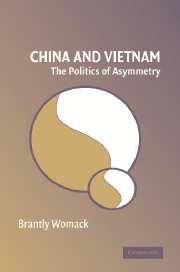Book contents
- Frontmatter
- Contents
- Tables, Figures, and Maps
- Preface
- Introduction
- 1 General Overview
- PART ONE BASIC STRUCTURE
- PART TWO THE RELATIONAL DYNAMIC
- 5 From the Beginnings to Vietnamese Independence
- 6 Unequal Empires
- 7 The Brotherhood of Oppression: 1840–1950
- 8 Lips and Teeth: 1950–1975
- 9 Illusions of Victory: 1975–1991
- 10 From Normalization to Normalcy
- 11 Change and Structure in Asymmetry
- Appendix: Glossary of Terms
- Bibliography
- Index
11 - Change and Structure in Asymmetry
Published online by Cambridge University Press: 02 December 2009
- Frontmatter
- Contents
- Tables, Figures, and Maps
- Preface
- Introduction
- 1 General Overview
- PART ONE BASIC STRUCTURE
- PART TWO THE RELATIONAL DYNAMIC
- 5 From the Beginnings to Vietnamese Independence
- 6 Unequal Empires
- 7 The Brotherhood of Oppression: 1840–1950
- 8 Lips and Teeth: 1950–1975
- 9 Illusions of Victory: 1975–1991
- 10 From Normalization to Normalcy
- 11 Change and Structure in Asymmetry
- Appendix: Glossary of Terms
- Bibliography
- Index
Summary
Three Kingdoms, the first Chinese novel and part of the cultural heritage of both China and Vietnam, begins with the famous lines, “The empire, long divided, must unite; long united, must divide. Thus it has ever been.” Our review of the vicissitudes of the relationship between China and Vietnam could yield the same conclusion concerning asymmetric relations. The relationship has experienced an impressive variety of forms. Given the changes in the past, one must ask whether the present age of normalcy is the final resting place of the relationship or merely the most recent phase.
Of course, reviewing the grand sweep of history can cause a loss of existential perspective. If normalcy lasts only as long as French colonialism in Vietnam, it would frame the life experience of three generations. If it lasts as long as the phase of traditional unequal empires, then it would end when the millennium that we are now beginning has grown old. Moreover, although normalcy does not resolve the tensions inherent in asymmetry, it also does not have an obvious internal contradiction that would shorten its span. It would be far more reasonable to predict, as Alexander Woodside did in 1979, that a period of hostility would lead to a mutually frustrating stalemate and thence to a (relatively) early normalization. If we are to try to gauge when “mature asymmetry” might pass into old age and death, we will have to locate an aging process or to analyze what factors might cause it to have a fatal accident.
- Type
- Chapter
- Information
- China and VietnamThe Politics of Asymmetry, pp. 238 - 256Publisher: Cambridge University PressPrint publication year: 2006



